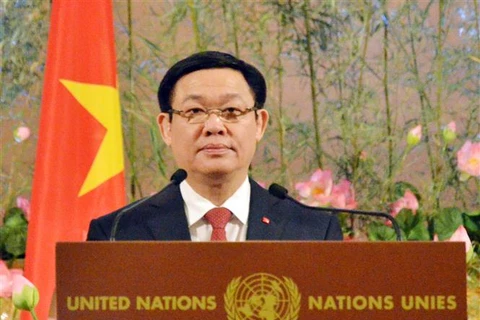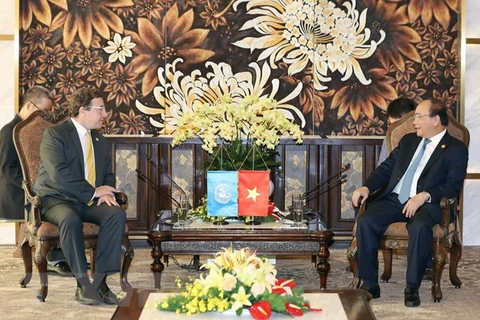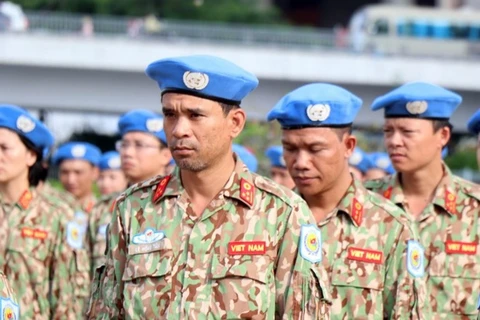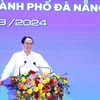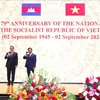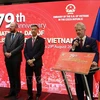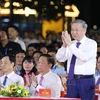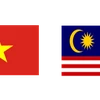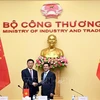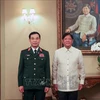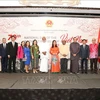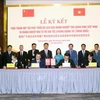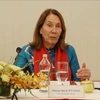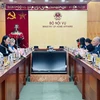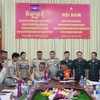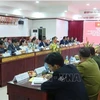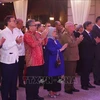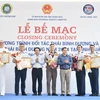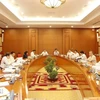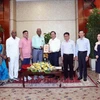 Vietnamese military doctors held the flags of the United Nations and Vietnam at the Juba International Airport, beginning their duties in UN peacekeeping missions in South Sudan.(Source: VNA)
Vietnamese military doctors held the flags of the United Nations and Vietnam at the Juba International Airport, beginning their duties in UN peacekeeping missions in South Sudan.(Source: VNA)Hanoi (VNA) - Vietnam has made active contributions to the United Nations’ activities and the country’s prestige and international status have improved since it joined the UN on 20 September 1977.
The country became a UN member at a time when it had to deal with post-war severe consequences, re-organise its backward economy and restore production after the liberation of the south in 1975.
Major donor organisations included the UN Development Programme; the World Food Programme; the UN Children's Fund; the UN Population Fund; and the World Health Organisation provided substantial support for the Vietnamese Government’s investment in terms of socio-economic development, focusing on education, health care and family planning.
In 1986-1996, Vietnam implemented a renewal roadmap, and the UN’s cooperation became a significant source of support for the Government of Vietnam in building development policy, enhancing the capacity of State agencies and their personnel’s skills.
During 1997-2000, the UN prioritised providing assistance for Vietnam in poverty reduction, social policy; reform and development management; environmental and natural resources management; aid coordination, state management and resource mobilisation.
In the process of industrialization, modernisation and international integration in Vietnam, the UN has helped the country implement its socio-economic development goals and fulfil the UN’s Millennium Development Goals (MDGs).
After Vietnam became a middle-income country, the cooperation between Vietnam and the UN shifted from technical assistance to policy consultation, concentrating on areas such as sustainable poverty reduction, environmental protection, response to climate change and sea level rising, human resources training, institution building and gender equality.
Regarding development cooperation at the UN, Vietnam has promoted South-South cooperation through building models and engaging in trilateral cooperation projects, and worked with the UN to pilot the Delivering as One (DaO) initiative, thus contributing to improving connectivity among UN organisations in Vietnam.
Vietnam is working to implement the 2030 Agenda for Sustainable Development, the Paris Agreement on Climate Change and the UN Initiative on resilience to El Nino and La Nina.
On July 5, 2018, Vietnam and the UN signed the new One Strategic Plan (OSP) for 2017-2021 between the Vietnamese Government and the 18 UN agencies.
This is an important milestone for the two sides, marking their strong commitment to implementing the Agenda for sustainable development until 2030.
Vietnam has contributed to the core cooperation pillars of the UN and to the fulfillment of diplomatic objectives and tasks of the organisation.
The country also upholds the fundamental principles of international law and of the UN Charter in resolving international conflicts and disputes by peaceful measures, on the basis of respect for independence, sovereignty, territorial integrity, non-interference in internal affairs of any country and not using force or threatening to use force.
Vietnam has made significant contributions to disarmament, especially nuclear disarmament and other weapons of mass destruction.
As the coordinator of ASEAN at the UN Security Council, Vietnam has spoken on behalf of ASEAN countries at several open discussions of the council on issues of ASEAN’s concern. The country has also been involved in the intergovernmental negotiation process of the UN General Assembly on the reform of the UN Security Council.
Vietnam has received high votes to help run UN agencies, notably the UN Security Council (UNSC) (2008-2009), the UN Economic and Social Council (the terms of 1998-2000 and 2016-2018); the UN Human Rights Council (term 2014-2016), the UNESCO Executive Council (2015 - 2019), and the International Law Commission (2017-2021).
Vietnam was credited as ASEAN coordinator at the UN Human Rights Council. In this role, the country is active in coordinating the stances of ASEAN countries in the council.
Asia-Pacific countries unanimously nominated Vietnam as the only candidate of the region for a non-permanent seat at the UNSC for the 2020-2021 tenure at the election in June next year. This showed their support for and trust in Vietnam’s role and capacity.
Vietnam has actively participated in multilateral defence and security mechanisms, including UN peacekeeping operations, non-traditional security drills and other activities.
Vietnam is among four countries in Southeast Asia selected to be the training sites for the UN peacekeeping forces, with the first training course to be held in Vietnam at the end of this year.
In implementing the 12th National Party Congress’s Resolution, Vietnam will continue its active work to help maintain peace, stability and sustainable development in the region and in the world, and to further deepen its relationship with the UN.-VNA
VNA
